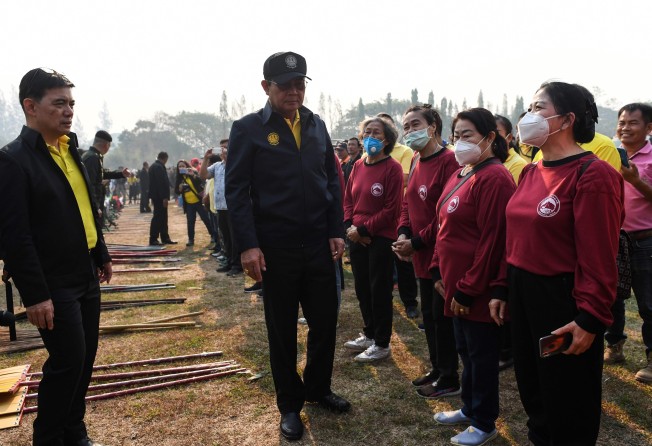Chiang Mai’s smog crisis threatens to smother Songkran celebrations and hurt Thai tourism industry
- Tourism revenue, particularly from Chinese visitors, underpins Thailand’s economy
- Arrivals recovered after deadly Phuket boat accident last year but Chiang Mai’s smog crisis is another setback

Thailand’s Songkran festival, marking the traditional New Year, is just weeks away but celebrations in Chiang Mai may be muted as the northern city confronts its worst ever smog crisis.
Widespread open burning and “man-made” forest fires for agricultural purposes along Thailand’s western and northern borders and in the neighbouring countries of Myanmar and Laos have left the city and other nearby provinces blanketed in a dim orange haze.
On Tuesday afternoon, Chiang Mai’s air quality index reading was 264 or very unhealthy, compared to 91 for Bangkok, 85 for Singapore and 55 for Hong Kong.
Ubonrat Yasai, a 37-year-old Chiang Mai resident, was prescribed anti-allergy pills after she experienced a swollen neck and breathing problems.
“There is an air purifier in my bedroom but I can still smell the smoke throughout the night,” she said, coughing uncontrollably.
In 2002, Thailand and its neighbours signed a legally binding environmental contract called the Agreement on Transboundary Haze Pollution. However, little progress has since been made in confronting the decades-long problem of forest erosion caused by farming and foraging of wild plants, which generates income for villagers during the dry season, expected to be longer than usual this year.
“The northern haze crisis could drag well into May as El Niño leads to a severely dry season,” said Tara Buakamsri, Thailand director for Greenpeace Southeast Asia.
Yet he expects little response from authorities, citing “the government inaction during the January Bangkok smog crisis and local authorities’ need to wait for Bangkok’s approval to make any decision”.
The scale of the smog crisis has prompted a backlash among residents, who have campaigned for the dismissal of Chiang Mai’s provincial governor and sought donations to buy face masks and air purifiers for 500,000 northerners most at risk.
Prime Minister Prayuth Chan-ocha visited Chiang Mai on Tuesday, handing out firefighting supplies and telling volunteers at a military base: “The government is ready to support in terms of equipment to improve the situation within seven days. Laws need to be strict to deal with forest burning. Locals need to change their behaviour and cooperate. The civil sector needs to participate and keep watch and please adjust the work pattern to the situation.”
#ฝุ่นเชียงใหม่ This is what Rinkam intersection looks like.
Chiang Mai Pollution is beyond harzardous. People Living here are risking their lives.
Government should do something to fix this issue right now! pic.twitter.com/kVk0qkEdCI— Vin (@nnyvvynn) March 30, 2019
Last year, Chiang Mai welcomed 3.8 million foreign tourists, including more than 1 million visitors from China. The smog crisis, however, is expected to take a toll on the tourism industry before and during Songkran, which is celebrated April 12-16. Furthermore, authorities have been reluctant to declare a state of emergency for fear of exacerbating the downturn. Several flights have also been diverted due to poor visibility.
Korawan Sangkakorn, who leads Chiang Mai University’s Centre of Tourism Research and Development, said a state of emergency should have been declared.
“It might affect the province’s image but we should deal with the smog first and cancel the state of emergency later,” Korawan said.
Appeal for N95 face masks in smog hit Chiang Mai: https://t.co/XeeHoaM5Og pic.twitter.com/ILQZsjFTFQ
— Thaivisa (@georgebkk) March 30, 2019
The air in Chiang Mai contains dangerously high levels of PM2.5, minute dust particles that can penetrate and damage the lungs and respiratory system. On Tuesday, central Chiang Mai registered 329 microgrammes of PM2.5 per cubic metre (g/m³), far exceeding Thailand’s safety level of 50g/m³, or the World Health Organisation standard of 25g/m³.
Udom Chidnayi, owner of Udomporn Tours, reported cancellations of day trips to the mountainous areas of Chiang Mai because of the haze.
Despite the high levels of PM2.5, Udom insisted there was little point in declaring a state of emergency, asking: “What would be gained from declaring a state of emergency? Will we get hundreds of aeroplanes for the rain-making efforts at once? Declaring a state of emergency now might have effects for years to come.”
More than 38 million tourists visited Thailand in 2018, including 10.5 million Chinese tourists. Last year, those Chinese accounted for a quarter of Thailand’s annual tourism revenue, which is about 2 trillion baht (US$63 billion) overall. This year, Thailand has set a target of 12 million Chinese tourists.
In July 2018, dozens of Chinese tourists died when a ferry sank near Phuket. The accident impacted Chinese arrivals, although the numbers recovered after the Thai government introduced a visa-on-arrival fee waiver. However, Chiang Mai’s smog crisis could lead to another downturn.
Panlop Saejew, vice-president of Chiang Mai’s chamber of commerce, said the moment to declare a state of emergency had passed but urged authorities to communicate with tourists about the situation.
“Some 80 per cent of 3,500 foreign tourists landing at Chiang Mai airport on average daily are Chinese,” Panlop said.
“They should be warned, although tourists from cities like Chengdu have experienced air pollution before. Group tourists who book for the trip in advance have not cancelled much but we have seen those in the category of FITs [Free Independent Tourists] changing plans and visiting the islands, like Phuket, instead.”
Udom, for his part, offered a solution to address the cause of the haze: “If you distribute income to the villagers through tourism, the villagers don’t have any reason to burn the forests, do they?”